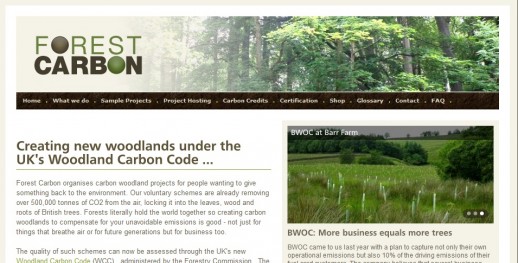
Here’s the latest from Forest Carbon Ltd, more information can be had from their contact details at the end of the article.
Forest Carbon Ltd – the UK’s principle broker of voluntary UK forestry carbon credits – welcomes the launch of Forestry Commission’s new Woodland Carbon Code this week. This will lead to a much-needed increase in quality woodland creation in the UK.
Forest Carbon is the first UK provider of woodland schemes accredited under the new Code through its work in trialling the process over the past six months at two new woodland creation projects in Scotland where 77,000 native trees were planted.
Durham-based company Forest Carbon offers UK landowners an introduction to corporate finance for new woodland creation. The business has run projects for The Green Insurance Company, Mears Group, BWOC, M&S, and Stagecoach among others since its creation in 2006.
The Woodland Carbon Code establishes the criteria that will ensure the integrity and consistency of UK carbon-funded afforestation projects. These include the Kyoto Protocol principle ‘additionality’, carbon accounting, permanence, consultation with stakeholder groups and adherence to UK biodiversity standards and the UK Forestry Standard.
Even before the Code’s development and launch, Forest Carbon Ltd has always met the criteria the new Code stipulates through application of its own ‘Forest Carbon Standard’ which was designed in the absence of an existing UK standard. But the Forestry Commission’s new Code is welcome because it will ensure that all organisations undertaking carbon woodland creation in the UK will work to strict and consistent quality standards
Foremost is ‘additionality’ which principle requires a clear demonstration that a woodland project could not go ahead without its carbon-related funding (i.e. the new planting must be additional to “business as usual”).
James Hepburne Scott, co-founder of Forest Carbon, said: “Across the UK we are seeing a rising level of interest among landowners for woodland carbon capture schemes and the additional revenue stream they offer. But landowners also require formal recognition for the long-term quality of those new carbon woodlands
“I welcome that, through the Woodland Carbon Code, we can now give UK landowners, foresters and carbon investors the confidence that they are making a verified contribution to climate change mitigation and the wider natural environment
Steve Prior, co-founder of Forest Carbon, said: “Our clients belong to a vanguard of insightful and responsible businesses taking voluntary action to tackle their own environmental impact and simultaneously address the need for increased UK woodland cover. Serious carbon investors will only invest in schemes that are seen to provide genuine benefit. The advent of the Code only serves to reinforce their early voluntary ‘green’ actions and will give confidence to others in joining them.
“The code represents a huge achievement for the Forestry Commission, taking forward the spirit of Kyoto, and we are confident it will stimulate more carbon capture schemes in the years ahead.”
Jeremy Finnis, owner of Dell estate near Loch Ness, where Forest Carbon enabled the planting of a 200-hectare mixed forest earlier this year, said: “We are absolutely delighted with the new woodland. It is the realisation of a long-held ambition to establish a large mixed forest from scratch. The help that Forest Carbon – with Green Insurance Company funding – gave us was crucial in bringing the project to fruition. We couldn’t have done it without them. The procedure was surprisingly straightforward and the result is now there for all to enjoy.”
More information
Forest Carbon contacts:
Phone: 0845 680 4480
e-mail: info@forestcarbon .co.uk
Forest Carbon homepage: http://www.forestcarbon.co.uk/
Forest Carbon project examples: http://www.forestcarbon.co.uk/corporate-carbon-capture/
Forestry Commission Woodland Carbon Code: http://www.forestry.gov.uk/carboncode
UK Forestry Standard: http://www.forestry.gov.uk/ukfs